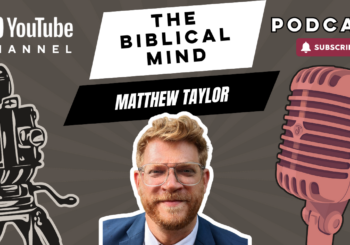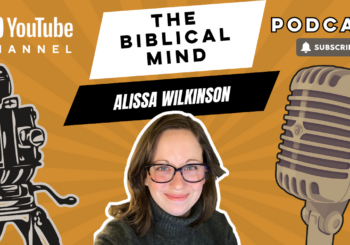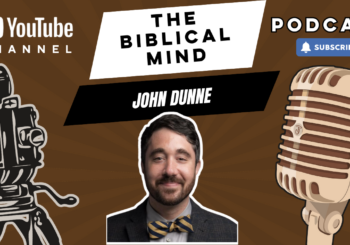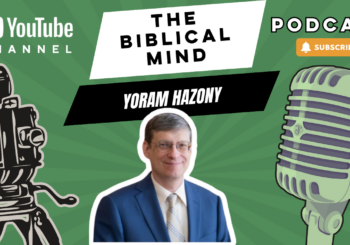On Whether There Is Sacred Music (Delvyn Case)
Why do we think of some music as sacred music and some music as secular? Is it merely a lyrical or a historical distinction, or is there something about the style and genre that makes certain songs feel “spiritual”? Is the music of the ancient Hebrews more or less sacred than that of a modern Catholic mass or an evangelical megachurch? We are likely to distinguish between these different eras and genres to help categorize them as sacred or not; however, we should be more willing to challenge this distinction.
In this episode, Dru Johnson interviews Delvyn Case, an accomplished composer, scholar, and performer, about the way Christians view music. As they break down the boundaries between secular and sacred music, they discuss why certain types of music feel more spiritual (such as Gospel or hymns) than others. They talk about bad worship music and how it influences our emotions to teach us thin, wobbly theology. They then discuss religious imagery, especially the figure of Christ, in popular music. Is Jesus more like a punk rocker, a hippie, or a communist? Music has the power to educate us and draw us nearer to God; however, it also has the power to mold our emotions and thoughts in sneaky, subconscious ways. If we learn to listen more closely, we can not only grow shrewder in our understanding of its power, but also discover its excellencies and faults.
Show notes:
- 0:00 “Sacred music” versus “secular music”
- 3:56 Gospel music as transcendent
- 9:30 The role of music in church
- 14:12 Bad worship music
- 19:09 Spiritual and educational music
- 22:35 Popular music using church motifs
- 28:18 The view of Jesus in pop music
- 34:33 How to critically engage music
Read Delvyn’s discussion of Jesus in pop music.
Show notes by Micah Long.
Credits for the music TBM podcast: hebraicthought.org/credits.
Transcript
Delvyn Case: So first of all, when you say the word “sacred” music to somebody, probably someone in the church, they’re going to think of church music. They’re going to think of music we hear in church or use in church. Usually when you think about, say, worship choruses or maybe even hymns, we tend not to think about it as sacred music. It’s music we use in church.
Another thing that people might think of is a choir singing in the background of a film, music that evokes a certain sense of God and the divine, right? So already those are two really different things. There’s sacred music being music that’s used in church to help us encounter God in community. And then there’s music that simply refers to a certain narrow conception of God or religiosity in the West, which might be like a choir or a hark, you know, to be silly, if you will.
Dru Johnson: Or like in a movie where somebody has a moment of divine epiphany and you just hear the choir of angels. That’s almost like a slap sticky soundscape.
Delvyn: Right. It’s a quick and easy signifier—just a, hey, this person’s having a moment here. Worship is sacred in the sense that it’s dedicated to God, if not by the composer—because frankly, a lot of composers are not, or were not people of faith, but that hasn’t kept them from writing music that we sing and use in worship. I mean, that’s common grace for me, you know, that’s “nothing can separate us from the love of God,” you know? It’s all God’s creation.
But at the same time, the music that evokes the sacred is a little more complicated because it matters. If you sort of have to even know what the reference is now, there’s sort of a baseline. Sound in sort of Western culture that the choir, the hark sort of, there’s a sense of, of usually classical music that invokes the sacred as like this sort of signifier.
But of course, even in Western culture, there are lots of other kinds of music that evoke the sacred, like Gospel music, but also the Gospel choir, right. Orient chant, which, for today’s Catholics, isn’t as powerful, but two generations ago, that was the music of the church. And so I think that these both of those are problematic because they don’t completely exhaust the ways that music can function for a person of faith or in the church. While at the same time, it narrowly prescribes a certain understanding of who God is.
As a simple example of this last, for most of the sacred-sounding music, we hear slow-moving chords in a quiet choir or orchestra. That’s a very disembodied sense of heaven and God, and Jesus was a flesh-and-blood person. So there’s a sort of Docetism at work here, the idea that maybe Christ wasn’t fully human. And the music that tends to represent God tends to be very ethereal and meditative, whereas the music of Jesus was probably Judean folk music, you know, that you dance to.
Dru Johnson: Yeah, it makes you wonder what Jesus and his original audience, what kind of musical tones or forms would have sounded sacred to them. I assume that which was connected with temple worship, right? Songs of the ascent. I don’t think we know, but acapella Psalm-singing might have been the sacred-sounding thing to them. I had never thought about that.
And even when you mentioned Gospel—you think, well, there’s very quick move from Gospel of sacred music to Gospel as like funding the pop industry, right? A lot of it is Gospel-centric or Gospel top 40 music.
Delvyn: Well, I should also mention that these two things come together, because it’s not uncommon for a pop artist to write a song that has a little more depth to it, that wants to explore what is love really, or even lover as savior, and they bring in the Gospel choir because it points towards the divine or something deeper.
And it’s a very cheap way to do it musically in the sense that it doesn’t require an investment on the part of anybody involved in that production. It’s kinda like Bonhoeffer’s cheap grace, right? It’s an easy way to just accept it and say, well, that’s good. You know, I guess we’re being serious now because there’s a Gospel choir in the background. It’s not meant to be an insult, but you can read it as fundamentally an insult to the great tradition of black Gospel music, which has been formed from the community. It was separated and oppressed for hundreds of years, but it has this extraordinary tradition of joyful music, full of hope. That’s being sort of skimmed off and stapled into a Lady Gaga song to show that, oh my gosh, now we’re being serious.
Dru: Wow. You are, as they say, spittin’ mad truth here. This is a lot right in a row. Have you seen the Kennedy Center honors for Led Zeppelin when the Wilson Sisters did “Stairway to Heaven”? When I first heard that I was like, oh, “Stairway to Heaven.” I mean, come on. This song has been done and done and done. And by the end of it, I was in tears watching this. Yo-Yo Ma was in the audience in tears watching this because at the very end of it they brought in a massive African-American Gospel choir. And as you were saying, this struck me like, I’m not saying it was a cheap move. But it seemed to highlight the transcendent nature of Led Zeppelin’s music, that it was, you know, epic. It was like almost as if it was from the heavens itself. And I mean, everybody was crying in the entire auditorium and I’d never thought about using sacred music in this way.
Delvyn: And it’s the same when you hear Handel’s Messiah performed by like the Mormon Tabernacle choir, like 200 people. Handel’s Messiah was not performed with large choirs. It was a couple dozen people max, and these days, a lot of more authentic performance practice people in classical music will do the Messiah with a small group. It’s really different to hear “hallelujah” sung with 24 people versus 200. This idea of the large choir that’s really loud, that fills the space, that this points to a transcendent God who’s very far from us and very overpowering. You could see it as an element of masculinity here, of a traditional kind of masculinity. And yes, the Bible does refer to God in those ways, but it’s not the only way.
I mean, think about the still, small voice—that’s a great example of Elijah there. And certainly Jesus is the immanent God. Right? And in the sacraments, the idea that this regular old bread, whether you think it becomes the body or it becomes the real presence, it’s still just flour and water and oil.
Dru: No choir sings when you bite into it.
Delvyn: Remember in the third Indiana Jones movie with the Holy Grail, and it’s not the golden cup, it’s the little clay bowl? That’s what I like to think of. There’s another God that is rarely pointed to using these cliched tropes of sacred music.
Dru: If I’m hearing you correctly, if we think about the use of music in church—so let’s not even say sacred music, let’s just say the use of music when we’re approaching what we consider sacred space, time, or relationship—if I hear you correctly, there’s almost a sense where it’s a culturally loaded moment so that the culture is already pre-packaging some elements there. And that’s neither good or bad. That’s just the way it goes.
And then I also wonder how you feel about underscore, like in movies, and how music kind of serves in music in that space. And a church serves almost like an underscore. And I mean that in the dangers, like there’s some movies where the underscore is basically telling you how to feel. Like Dunkirk. I feel like that musical score was forcing feeling on you versus allowing you to feel something. Do you see a role for music, whether we want to call it sacred music or not, as a kind of underscore to our times gathered as a community?
Delvyn: I’m of two minds on that. I am with Augustine and Plato, both of whom were very suspicious about music’s power to appeal just to your emotions or to point you towards your feeling rather than truth or logic. And then it gets really complicated. I’ve been a church musician, and when I play my 30 seconds of music on the organ right after the sermon, I can totally change the interpretation of that sermon. I can do that by what I play. And so on. I know that those 30 seconds are the linchpin, when I played in the Episcopal church, between the liturgy of the Word and the liturgy of the sacrament, setting up the consecration of the host.
There are moments in the service where the church musician has way too much power, way more power than the pastor probably even knows. As a person of faith who sits there and listens and tries to serve God through what I’m doing, I’m not trying to undermine what she or he says, but there’s a lot of power. And of course, how you introduce or end a hymn.
One of the things that I’ve liked to do in the past is in a recessional, I like to play sometimes the last verse of the hymn quieter. Now, generally you tend to hear that as the final, Go forth, hallelujah, go get ’em team! But I also like the churches that end with, Go forth to love and serve the Lord, to wash others’ feet. So for me, I like the idea that the fourth verse of the hymn isn’t that powerful explosion of excitement, but the reminder that we need to enter humbly into the rest of our week, if that makes sense. I think those are ways that, hopefully done with sensitivity and faith, music can do a lot to affect how we worship.
However, the very fact is that music can do that, whether you’re good or bad, based on what you play. If you have nefarious purposes, you can do a lot of damage. So again, I agree with Plato who really didn’t want music in the Republic because it’s hard to control. You can’t really explain what it’s doing, how it does its thing. We’re not going to get rid of music in the church. I’m not advocating for that. But one of the things that I focus on in my career as a musician and as someone who does work at the intersection of music and the Christian life is to equip, whether through speaking or writing or talking or playing, fellow believers with some abilities to experience music critically. And I don’t mean critically as meaning negative. I mean, critically with critical thinking—to know what’s being done to you rather than just let it wash over you.
Dru: So many people, especially younger people, especially like my students from California, they won’t even know what you’re talking about because they go to a nondenominational church where music is essentially whatever the CCLI-licensed music of the week is. Hillsong, Bethel, etc. Teaching young people the Bible, I’ve come to realize, in very painful ways often, that a lot of their perplexity about what’s in Scripture or misunderstandings about Scripture aren’t from bad preaching or bad teaching. It’s largely from the lyrics of the worship songs and how the particular musicality of those songs carries those lyrics into them and into their bodies in a particular way.
And so I’m not fighting them or their thoughts. I’m fighting what this worship music has done for them when it’s paired with preaching in a certain communal context. Have you ever thought about this new wave—I mean, we say new wave, but it’s really 50 years in the making—this new wave of sacred music in the church? And I don’t think it’s nefarious. I think a lot of it is just unintentional cliche, but I don’t know. What are your thoughts?
Delvyn: Well, you bring up the fact that it’s the lyrics that do some of the damage, and so far I’ve been talking more about just music, music qua music, how music moves beyond words to create an emotion. If we were being cynical about it, a cause and effect, like Pavlov’s dog: I play this chord and you think of God. So music has its own power, but then when you put words to it or when you use music to bring words to life, then we have to talk about the literal meaning of the words. And I think the theological problem with praise and worship music is that the music isn’t set up in ways to allow for a very robust and deep theological message.
And I don’t mean that simple music can’t be powerful. Simple music can be powerful. That’s what I’m saying. It can be meditative. But simple music cannot carry complex words. It’s kind of like trying to carry air in a bucket in the sense that it’s just not the right container. There might be air in there, but you can’t keep it in there. So you mentioned the spirituals, right? The African-American spiritual operate—and again, I’m speaking about this as a white person, most of my experience has been from studying the spirituals historically and musicalogically and also being touched by them at certain times in church.
It’s not the music of the spirituals that makes them great because the music of the spirituals is essentially a sort of template. To use a spiritual in a service, there is the song leader who improvises as she or he sings the call, and then there’s the call-and-response, which creates community in the moment. So for example in the spiritual “no more auction block for me, no more, no more,” right, “many thousand gone,” right, which is clearly about slavery, but it’s also a song about hope in the ever after, as well as God’s deliverance of black Americans. But the point is that when they sing, “No more auction, no more auction block for me,” and the congregation sings, “No more, no more,” it immediately creates a connection. You’re actually creating a piece of music together. And the call-and-response does that in a different way than singing along with something. And then also the history of the spirituals, the fact that you can’t sing a spiritual without trying to imagine or experiencing somehow the story of slavery and the need for people to be redeemed and the hope and faith of a people to be redeemed by God in the here and now, as well as in the future. So all of that’s wrapped up. The words of the spirituals aren’t the most important thing.
Now in a hymn, you have four stanzas of oftentimes very densely theologically rich words, and the music is a little more complicated. So what happens when you take sort of the worst of both worlds, you take music that doesn’t have the powerful history and structure of the spirituals and words that aren’t robust and deep, you have a lot of music you’re talking about, which I think can evoke spirituality and worship, but it doesn’t educate.
Dru: That is a very insightful critique and I don’t mean critique in the negative sense. I mean that you’re helping us think about what we’re doing, because I think we uncritically imbibe a lot of worship music in the church. And I used to be a minister in the Church of Scotland, where their church hymnal, the CH4, they didn’t pull the bad hymns out. Like they left all of them. They have hymns in there that just end on minor keys and they send you out on a minor key. There’s something mildly respectful about that, or respectable, I guess.
So we talked about music, we talked about lyrics, the call-and-response. I wonder if that call-and-response spiritual is something closer to what we would want to call sacred music, in the sense that there’s some theology, narrative, history with God and a gathering together. And it’s not something that’s isolating, individualizing, but it’s actually calling us together as a community and obviously pushing us forward in hope. If we’re going to slap “sacred” on something, that feels much more like the space where we would want to do that, songs that educate in some way.
Delvyn: So what you’re describing would maybe be described as a liturgical music, broadly defined, whereas music that’s used in a service to help community happen, to help worship happen, to help the sacraments happen, the goal is educational, but it’s also to create a unique holy or set apart experience of community, which is what call-and-response does. And I think that singing four-part hymns without call-and-response does that too. And the fact that we are singing with people, I mean, who sings hymns by themselves? Probably not that often. And the depth of the words. So I think it can happen in lots of ways.
Music without words powerfully prepares our hearts and minds for parts of a service, whether you’re in a liturgical service, like an Episcopal church or something, or a non-denominational service. There’s underscoring for prayer. I used to go to a Baptist church where, once we would pray, the organ would play quietly. And for me, even if I thought the music was a little cheesy, even if there’s a little too much vibrato that the organist used, a little too Baptist [laughs], that little bit of music set apart that moment of prayer.
Now, when I go into an Episcopal church and I hear thees and thous and this 17th-century British language, I feel like I’m praying because it feels so different. If your worship leader is praying without thees and thous, how do you make that prayer seem different? And one of the ways is adding music. You know what I mean? It’s a simple thing. So I’m trying to be very positive about how music can do this liturgically. Now, the other thing we do of course is, as you said, it can educate, and that is a different kettle of fish.
Dru: I want to switch gears here. Let’s talk about how the non-sacred music industry likes to glom onto the religious. You said you’ve been working a little bit on images of Jesus in music and in our culture. Why are people who wouldn’t identify themselves as Christians or interested in Christian culture, why are they grabbing onto these images of Jesus? And why is religious imagery so powerful? I think of Madonna grabbing onto Catholic imagery very heavily in order to move people in a particular way. Why do you think they’re grabbing onto these things that belong to us, as it were?
Delvyn: Well, that’s a lot of huge questions. The work I’ve been doing is that I’ve been looking at secular pop songs about Jesus or that reference Jesus from about the past 50 years. And that was the basis of an article I just published, but also a much larger project. I found almost 600 songs.
Dru: Wow. I could only think of “Your Own Personal Jesus,” by Depeche Mode. I can’t think of a single other one. I’m sure you can name some and we’d go, “Oh yeah.”
Delvyn: Most people say, “Jesus, Take the Wheel,” Carrie Underwood.
Dru: Oh, I think I had three babies in diapers around the time that song came out, but I am familiar with it.
Delvyn: “Jesus Walks,” by Kanye West, which is 15 years before his conversion. Powerful, powerful song. Basically I spent a lot of time searching Genius.com for “Jesus” and all words associated, and I was just amazed at the number I found in every genre. So you are correct in saying that many, many famous artists, whatever their faith, have written songs about Jesus, but so many other artists in so many genres have done this. And I don’t know this, but my belief is that, after Santa Claus, Jesus is the most cited literary figure in popular music. Not to imply that Jesus wasn’t real, but that there are lots of songs about Santa and then there are songs about Jesus, and I don’t know who would be third.
Dru: Wait is Santa really number one?
Delvyn: Well, think of all the Christmas songs, like all the Christmas pop songs. Beyond the genre of Christmas music, I can’t think of any figure from our culture who would be even close to Jesus. The Velvet Underground has a song called “Jesus.” It’s amazing the number of pop artists who’ve written songs about Jesus, no matter their faith. The point is that Jesus has been a fascination by hundreds upon hundreds of pop artists for 50 years and not just the famous ones, but a lot of the famous ones have explored Jesus. So that’s why I think it’s worth talking about.
To your question about why people are interested in Jesus, I think there are two main answers. One is that ever since the 1960s, pop music has had a streak of transcendence to it, an urge for transcendence. And that starts with the counterculture, the looking to Eastern spirituality or psychedelic drugs, or just the whole idea of a revolution in consciousness that happened in the 1960s, for good or for evil. And that was led by pop musicians who were willing to sing about the use of drugs or the exploration of religion, or how love can be salvific in a lot of ways. We don’t really see this in the rock and roll of 1958, you know, in “Johnny B. Goode.” But by the time we get to the Beatles and late sixties, a lot of musicians have turned their eyes upward, or at least inward, in the sense of trying to use pop music as a terrain for exploring the same questions that religion has explained. Like, why are we here? What are we supposed to do? What makes the world go ’round, basically?
So it’s natural for Western pop musicians—English-speaking Americans or Brits, especially Americans who tend to come from the South—that Jesus is their entrée into religion. So even though many musicians left Jesus behind, at least they think they have, if they have that one song on an album where they want to wrestle with claims of universality or transcendence, they’re going to talk to Jesus. They’re not going to talk to Buddha. And even if their Jesus is not the orthodox figure of the church, he’s the way in. He’s like standing at the door and knocking, and a lot of pop musicians are letting him in. But interestingly, when he walks through the door of these songs, he doesn’t oftentimes look or act like the Jesus that we are used to, which is the really cool part, actually.
Dru: A friend of mine made a point about this a couple of weeks ago to me that Jesus kind of gets a cultural pass. He does not get critiqued really heavily in our culture, unlike the ways that even Mohamad or Islam would be. Everybody thinks Jesus is cool. And some might even argue that the Christians got him all wrong. He was actually a cool guy. So how do you see him portrayed in these songs, mostly?
Delvyn: Well, the most interesting thing for me that I found from looking at these songs is that it confirms what you just said, what your friend said, which is that I’ve found virtually no songs that are anti-Jesus. What I’ve found is lots of songs that are anti-Christians, but they’re specifically anti-hypocrisy. So there are lots of metal and punk songs in particular that will say, Hey, Christians, look at your savior. Look how he acted in the Bible and look what you’re doing. To me, that’s a prophetic tradition.
Dru: I played in a punk band for a while. Your role was to tell everybody why they were wrong in society, which I guess I appropriated that academically as well. [laughs]
Delvyn: As a Christian, I like the fact that Jesus, you could say, gets a pass, but Thomas Jefferson took his razor and made his own Bible, cutting out the passages of miracles that he didn’t believe. It’s called the Jefferson Bible.
Dru: No Jewish stuff and no miracles.
Delvyn: Well, let’s be clear. We all do this to Jesus. It’s a difference in degree, not kind. Look, there are four gospels for reason. If the council thought there was only one way to understand Jesus, they wouldn’t have accepted four.
Pop musicians tend to give Jesus a pass. They tend to look at the biblical Jesus, who seemed like the ultimate rock and roller. He was a total rebel. He was so authentic that he was martyred for his cause. He didn’t really have any actual power, but all of his power came from his words and his performances. He had fans who adored him and followed him. In a lot of ways, he’s the archetype for the kind of power that a pop musician can have. They’re not going to get elected, but they can have 80,000 people screaming for them at Dodger Stadium because of what comes out of their mouth and the ideas they have and the lifestyle they live. I mean, Jesus was basically a rock-and-roller, right? And so they like this idea of Jesus, and especially, whether it’s punk or metal, they like his rebelliousness. They like his social critique. When they use him, they tend to use him against the church or the “principalities and powers,” whether it’s the modern church or Christendom, if that makes sense.
Dru: Is there an article or a book out there called “Jesus, the Punk Rocker”? Because if there’s not, you should absolutely write that.
Delvyn: It will be a chapter in my book. I talk about it briefly in this article.
Each genre does view Jesus generally differently. In punk rock, he tends to be—you know that old saw about how God made us in His image and then we return the favor? And just like, when Jesus says to his disciples, “Who do people say that I am?” And they say, “Well, some people are saying, Elijah,” you know? Even back then, people are trying to figure who Jesus was. And the gospel writers wanted us to know that. And then of course Jesus turns around and asks Peter, “Who do you say that I am?” And my book is called “Rock of Ages,” of course, a pun on the old hymn. But Jesus for punk rockers is a revolutionary. He is sticking up his proverbial Holy middle finger to the rest of the world, ’cause he’s hardcore, man.
In country music, Jesus is usually a buddy. He’s a friend, he’s a guy you have beer with, who you feel comfortable talking with. And the other thing in country music, Jesus oftentimes is compared to great country superstars. There are a lot of songs about Hank Williams and Jesus, or George Jones and Jesus, or Elvis and Jesus, because who are the gods of country music, you know?
In folk music, Jesus is oftentimes a Marxist, a poor man who came to upend the powerful empire. Modern folk music, singer-songwriting music tends to be really serious and about trying to figure out the right way to do things. And a lot of prayer songs are in folk music or people are trying to pray to Jesus to ask for guidance, for wisdom. So different genres imagine Jesus in different ways, but you’re right, across the board, Jesus doesn’t come across negatively.
Dru: You earlier said that you want to help people critically engage music. Is there one thing you could say to the normal person who just enjoys music? Here’s one thing you can do to begin this journey to start critically engaging the music around you and even the church music, the music that’s used in our assembly.
Delvyn: Thanks for asking the question. I can think of two things. I think that you simply need to be aware of how the music is making you feel. So, if you worship in a traditional service—I go to a huge church in Boston and the organ is massive. And at the last verse of the hymn, they use that organ pipe that’s floor-to-ceiling, and I can feel it. And that’s an easy way to feel power, glory, majesty, all these wonderful things, but people should be aware that the music’s doing that. It’s not just the words, it’s not just God, it’s not just community. There’s something that the music is adding. The next time you’re hearing or singing a piece of church music, worship music, maybe just see what the music is doing, versus the lyrics, versus the lighting, the church itself.
And the second thing is, if you’re thinking about sacred music, meaning musical settings of psalms for choir, or musical settings of the mass, like classical music, a great thing to do is simply go to a Wikipedia page for, say, whatever psalm you’re reading, and at the bottom of almost every Wikipedia page, there is a listing of musical settings of that psalm from the last 500 years. Pick two of them and listen to two of them, and they will undoubtedly sound really different, and the music will make you experience the text differently. And that’s a way to prove that the music is doing a lot.
So being aware of what music is doing in the moment when you’re worshiping is important. But if you want to dig a little bit deeper, compare and contrast two musical versions of the same biblical text, and that can also show you what the music does.
Dru: Well, Dr. Delvyn Case, thank you very much for your wisdom, insight, and your wit.
Delvyn: Happy to be here.
Subscribe now to receive periodic updates from the CHT.






